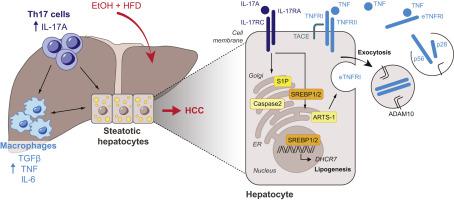当前位置:
X-MOL 学术
›
J. Hepatol.
›
论文详情
Our official English website, www.x-mol.net, welcomes your
feedback! (Note: you will need to create a separate account there.)
IL-17 signaling in steatotic hepatocytes and macrophages promotes hepatocellular carcinoma in alcohol-related liver disease
Journal of Hepatology ( IF 26.8 ) Pub Date : 2020-05-01 , DOI: 10.1016/j.jhep.2019.12.016 Hsiao-Yen Ma 1 , Gen Yamamoto 1 , Jun Xu 1 , Xiao Liu 1 , Daniel Karin 2 , Ju Youn Kim 3 , Ludmil B Alexandrov 4 , Yukinori Koyama 2 , Takahiro Nishio 2 , Chris Benner 2 , Sven Heinz 2 , Sara B Rosenthal 2 , Shuang Liang 2 , Mengxi Sun 2 , Gabriel Karin 2 , Peng Zhao 3 , Pnina Brodt 5 , Iain H Mckillop 6 , Oswald Quehenberger 2 , Ed Dennis 2 , Alan Saltiel 3 , Hidekazu Tsukamoto 7 , Bin Gao 8 , Michael Karin 3 , David A Brenner 2 , Tatiana Kisseleva 9
Journal of Hepatology ( IF 26.8 ) Pub Date : 2020-05-01 , DOI: 10.1016/j.jhep.2019.12.016 Hsiao-Yen Ma 1 , Gen Yamamoto 1 , Jun Xu 1 , Xiao Liu 1 , Daniel Karin 2 , Ju Youn Kim 3 , Ludmil B Alexandrov 4 , Yukinori Koyama 2 , Takahiro Nishio 2 , Chris Benner 2 , Sven Heinz 2 , Sara B Rosenthal 2 , Shuang Liang 2 , Mengxi Sun 2 , Gabriel Karin 2 , Peng Zhao 3 , Pnina Brodt 5 , Iain H Mckillop 6 , Oswald Quehenberger 2 , Ed Dennis 2 , Alan Saltiel 3 , Hidekazu Tsukamoto 7 , Bin Gao 8 , Michael Karin 3 , David A Brenner 2 , Tatiana Kisseleva 9
Affiliation

|
BACKGROUND&AIMS
Chronic alcohol (EtOH) consumption is a leading risk factor for development of hepatocellular carcinoma (HCC), which is associated with marked increase of hepatic expression of pro-inflammatory IL-17A and its receptor IL-17RA. METHODS
Genetic deletion and pharmacological blocking was used to characterize the role of IL-17A/IL-17RA signaling in the pathogenesis of HCC. RESULTS
We demonstrate that global deletion of IL-17RA gene suppressed HCC in alcohol-fed DEN-challenged IL-17RA-/- and Mup-uPA/IL-17RA-/- mice compared to wild type mice. When the cell-specific role of IL-17RA signaling was examined, development of HCC was decreased in both alcohol-fed IL-17RAΔMΦ and IL-17RAΔHep mice devoid of IL-17RA in myeloid cells and hepatocytes, but not in IL-17RAΔHSCs mice (deficient of IL-17RA in hepatic stellate cells (HSCs)). Deletion of IL-17RA in myeloid cells ameliorated tumorigenesis via suppression of pro-tumorigenic/inflammatory and pro-fibrogenic responses in alcohol-fed IL-17RAΔMΦ mice. Remarkably, despite a normal inflammatory response, alcohol-fed IL-17RAΔHep mice developed the fewest tumors (compared to IL-17RAΔMΦ mice), with reduced steatosis and fibrosis. Steatotic IL-17RA-deficient hepatocytes downregulated expression of Cxcl1 and other chemokines, exhibited a striking defect in TNF-TNFR1-dependent Caspase-2-SREBP-1/2-DHCR7-mediated cholesterol synthesis, and upregulated production of anti-oxidant Vitamin D3. Pharmacological blocking of IL-17A/Th-17 cells using anti-IL-12/IL-23 Ab suppressed progression of HCC (by 70%) in alcohol-fed mice, indicating that targeting IL-17 signaling might provide novel strategies for treatment of alcohol-induced HCC. CONCLUSIONS
Overall, IL-17A is as a tumor promoting cytokine, which critically regulates alcohol-induced hepatic steatosis, inflammation, fibrosis, and HCC.
中文翻译:

脂肪变性肝细胞和巨噬细胞中的 IL-17 信号传导促进酒精相关性肝病中的肝细胞癌
背景与目的 长期饮酒 (EtOH) 是发生肝细胞癌 (HCC) 的主要危险因素,这与促炎性 IL-17A 及其受体 IL-17RA 的肝脏表达显着增加有关。方法 基因缺失和药理学阻断用于表征 IL-17A/IL-17RA 信号在 HCC 发病机制中的作用。结果我们证明,与野生型小鼠相比,IL-17RA 基因的整体缺失抑制了酒精喂养的 DEN 攻击的 IL-17RA-/- 和 Mup-uPA/IL-17RA-/- 小鼠的 HCC。当检查 IL-17RA 信号传导的细胞特异性作用时,在骨髓细胞和肝细胞中缺乏 IL-17RA 的酒精喂养的 IL-17RAΔMΦ 和 IL-17RAΔHep 小鼠中,HCC 的发展减少,但在 IL-17RAΔHSCs 小鼠中没有(肝星状细胞 (HSC) 中缺乏 IL-17RA)。骨髓细胞中 IL-17RA 的缺失通过抑制酒精喂养的 IL-17RAΔMΦ 小鼠的促肿瘤/炎症和促纤维化反应来改善肿瘤发生。值得注意的是,尽管炎症反应正常,但酒精喂养的 IL-17RAΔHep 小鼠的肿瘤最少(与 IL-17RAΔMΦ 小鼠相比),脂肪变性和纤维化减少。脂肪性 IL-17RA 缺陷型肝细胞下调 Cxcl1 和其他趋化因子的表达,在 TNF-TNFR1 依赖性 Caspase-2-SREBP-1/2-DHCR7 介导的胆固醇合成中表现出显着缺陷,并上调抗氧化剂维生素 D3 的产生. 使用抗 IL-12/IL-23 Ab 药理学阻断 IL-17A/Th-17 细胞可抑制酒精喂养小鼠 HCC 的进展(70%),表明靶向 IL-17 信号可能提供新的治疗策略酒精引起的肝癌。
更新日期:2020-05-01
中文翻译:

脂肪变性肝细胞和巨噬细胞中的 IL-17 信号传导促进酒精相关性肝病中的肝细胞癌
背景与目的 长期饮酒 (EtOH) 是发生肝细胞癌 (HCC) 的主要危险因素,这与促炎性 IL-17A 及其受体 IL-17RA 的肝脏表达显着增加有关。方法 基因缺失和药理学阻断用于表征 IL-17A/IL-17RA 信号在 HCC 发病机制中的作用。结果我们证明,与野生型小鼠相比,IL-17RA 基因的整体缺失抑制了酒精喂养的 DEN 攻击的 IL-17RA-/- 和 Mup-uPA/IL-17RA-/- 小鼠的 HCC。当检查 IL-17RA 信号传导的细胞特异性作用时,在骨髓细胞和肝细胞中缺乏 IL-17RA 的酒精喂养的 IL-17RAΔMΦ 和 IL-17RAΔHep 小鼠中,HCC 的发展减少,但在 IL-17RAΔHSCs 小鼠中没有(肝星状细胞 (HSC) 中缺乏 IL-17RA)。骨髓细胞中 IL-17RA 的缺失通过抑制酒精喂养的 IL-17RAΔMΦ 小鼠的促肿瘤/炎症和促纤维化反应来改善肿瘤发生。值得注意的是,尽管炎症反应正常,但酒精喂养的 IL-17RAΔHep 小鼠的肿瘤最少(与 IL-17RAΔMΦ 小鼠相比),脂肪变性和纤维化减少。脂肪性 IL-17RA 缺陷型肝细胞下调 Cxcl1 和其他趋化因子的表达,在 TNF-TNFR1 依赖性 Caspase-2-SREBP-1/2-DHCR7 介导的胆固醇合成中表现出显着缺陷,并上调抗氧化剂维生素 D3 的产生. 使用抗 IL-12/IL-23 Ab 药理学阻断 IL-17A/Th-17 细胞可抑制酒精喂养小鼠 HCC 的进展(70%),表明靶向 IL-17 信号可能提供新的治疗策略酒精引起的肝癌。











































 京公网安备 11010802027423号
京公网安备 11010802027423号